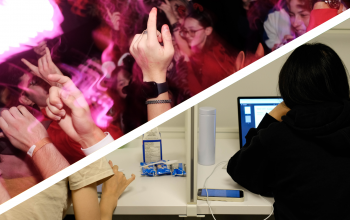Illustration by Ana Garza, The Mike Illustrator
Tips and advice on how to choose the best programs
Sharon Lee, Associate Features Editor
We have finally arrived at the month of March, which means midterm season is coming to a close. Now, we begin our transition to the final stretch before exams. For many of us, specifically Arts & Science students, there is one more thing to worry about at this time of year, which is our program enrolments. Whether we are currently first-year students or upper-year students looking to change programs, choosing one that is both suitable and enjoyable can be stressful. To help ease everyone’s mind, I compiled the following list of advice for those of us who may need some extra confidence in choosing the perfect programs.
Know what a POSt is
What does POSt stand for anyway? Our Program of Study allows us to focus on subjects that we have a passion to learn about. Each program has its own unique list of courses that you’ll take to fulfill program requirements and graduate after getting enough course credits. Your chosen program can give you priority enrolment access to most of its required courses, so you won’t have to worry about being put on the wait list for a course you’re interested in taking. Keep in mind the combinations of programs you need to enrol into: 1 Specialist; 2 Majors; or 1 Major and 2 Minors. It’s a good idea to take advantage of the program combinations by choosing a mix of subjects you are interested in. It’s OK to choose programs that are completely unrelated to each other!
Visit the Sidney Smith Commons website
This website (sidneysmithcommons.artsci.utoronto.ca/program) contains nearly everything that you need to know about program enrolment, so this should be your first stop when learning more about the process. The pages on here worth noting would include important dates on when enrolment period begins and ends, and stories about programs shared by upper-year students. The most useful section contained in this website would be the complete list of Arts & Science programs available to you. Besides reading about important info of programs you plan to enrol in, you can also discover other programs that you’ve never heard of and/or may sound interesting (did you know that there is a Planetary Science Specialist program?).
Be familiar with program requirements
Each program is categorized as a Type 1, Type 2, or Type 3 program. Besides Type 1 programs, which you can automatically enrol in on ACORN, all other programs require a request for enrolment, with some even requiring supplemental applications. If you plan on enrolling in a Type 2 or 3 program, it’s important to keep in mind its requirements to enter. For example, a lot of these programs need you to achieve a minimum average across select courses and most will need you to take prerequisite courses before being able to enrol. Requirements are also different for first-year and upper-year students, which depends on the number of full course equivalents (FCEs) you’ve already taken. All the info can be found on the Sidney Smith Commons website or by visiting the programs’ faculty websites. The requirements may sound like a lot to handle, but don’t worry, there are many resources out there that you can rely on to help you make program decisions.
Talk to upper-year students
Asking upper-year students about their experience in programs is one of the most reliable resources you can get since they’ve been in your position before and will know what to expect. They can be your friends, people in your classes, or fellow students at your college. Even reading statements written by students on Reddit can help! You can ask which specific programs are more difficult to enrol in or complete and which courses are interesting or require a lot of work. As an upper-year student myself, I can tell you that there’s no shame in asking other students for info on different programs. A lot of us are proud to list all the good things that our programs have to offer.
Talk to academic advisors at the registrar
If you want serious advice on how to enrol in programs, there are many academic advisors available for a quick chat at the University of St. Michael’s College (USMC) registrar office. Think of them as the guidance counsellors that you had back in high school. The advisors at USMC hold drop-in academic advising sessions from 2 to 4 p.m. each day, or you can book an appointment with them at any time. You can ask them anything about program and course enrolments, as well as other aspects of your academic life. One-on-one sessions give a good chance for you to voice out any personal concerns you may have. It’s a good idea to try out an academic advising session with them if you haven’t done so yet.
Go to workshops on program enrolments
Each year before the program enrolment period begins, the University of Toronto holds workshops that students can attend to learn everything they need to know about applying to programs. USMC also has its own program workshops for its students. The workshops for this year were held in February, so although it may be too late to attend one this year, you can keep an eye out for them next year in case you need them.
Choose subjects you genuinely enjoy
I saved this one for last because I think it’s the most important advice I have. While selecting programs to apply to, take a look at what courses they offer and whether you enjoy learning those subjects. If you have two different subjects you have interest in, consider choosing two majors or a major and two minors. It’s also good to keep in mind what kind of career you see yourself doing in the future. After all, the programs we take help us focus on specific subjects to prepare us for whatever jobs we’ll take on.
There you have it — all the tips I have compiled into one, short list. Hopefully these will come in handy, and good luck on applications!




